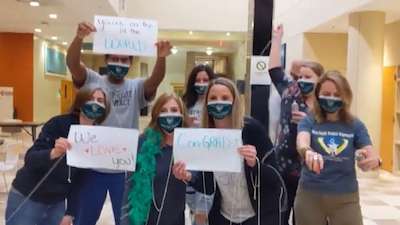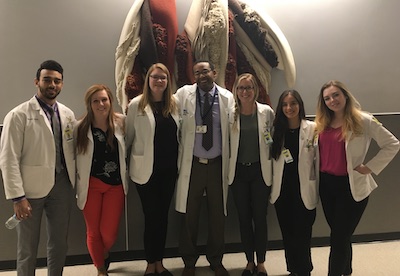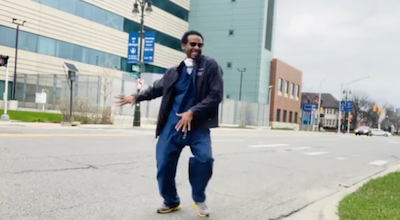Q&A with Excellence in Teaching Award-winning Associate Clinical Professor of Pharmacy Practice Dennis Parker
This spring, Wayne State University's Eugene Applebaum College of Pharmacy and Health Sciences presented two Excellence in Teaching Awards for 2020-21. The awards recognize outstanding faculty - one in Health Sciences and one in Pharmacy - who, to an exceptionally high degree, demonstrate comprehensive knowledge of their subject, superior classroom performance and high educational standards, among other criteria.
We sat down with the recipients for insight into their winning ways (see Dr. Nora Fritz's Q&A here), starting with Pharmacy winner Dr. Dennis Parker:

Q: Congratulations on being presented with the Excellence in Teaching Award! How does it feel to be recognized by leadership and your peers for this honor?
A: It feels amazing because I know the amount of talented faculty members we have at the college. The Doctor of Pharmacy program is largely team-taught as a collaboration between faculty from the departments of Pharmacy Practice and Pharmaceutical Sciences. We also have countless volunteer faculty who teach and mentor our students for most of their final year. To be recognized publicly amongst so many outstanding educators is truly a wonderful honor!
Q: What are some ways you were able to generate enthusiasm for learning and motivate your students to excel from afar during distance teaching?
A: Teaching remotely was difficult. Keeping students engaged even in person is challenging because there are so many distractions for students who typically have multiple supercomputers on their person with apps designed to capture and maintain their attention. The pandemic added additional stressors for students. Many of them live in multigenerational homes, where the burden of illness due to COVID-19 became their reality. Some students also struggled to find quiet places to focus on schoolwork. My approach was similar to what I do in person: I try to connect with people, and get to know a little something about them. People feel more engaged when they feel valued by the instructor. I try to give students plenty of opportunities to chime in with their opinions on the subject matter. I do this with interactive discussion questions to try to facilitate engagement.
Q: Did the pandemic change the way you approach your material or communication of lessons?

A: To some extent it did. I actually learned a lot about different ways to use technology. Admittedly, I wouldn't have learned about many of these tools if it wasn't for the pandemic. Also, the faculty had to be more deliberate about pre-planning the courses and content delivery. I think my material was actually a bit more organized during remote teaching.
Q: How do you achieve work-life balance - before the pandemic and during current conditions?
A: I think work-life balance is somewhat of a myth. Oftentimes life isn't going to be balanced. If it was, there wouldn't be an endless number of seminars about how to achieve "work-life balance!" You can't have everything all the time. The reality is that there will be times where situations seem unfair and the burden of all of the responsibilities of life can wear on your soul. My strategy is to try to have some perspective. I think about how difficult it would have been to be alive during the 1918 influenza pandemic, without all of the conveniences we take for granted. I think about all of the hundreds of thousands of people who have died due to COVID-19 or who are still suffering from long-term effects. I think about all of those who have lost their livelihoods. So in my opinion, it's not balance we should be looking for. It's perspective.
Q: What made you decide to go into teaching?

A: My initial plan was to be a teacher - most likely secondary education. My father, Dennis Parker Sr., advised me that teaching was a poor choice. He worked as a supervisor in a wastewater treatment plant and explained that many people who worked under him had teaching degrees and they struggled to find jobs. He directed me toward a career in pharmacy because he had read that the profession was growing. I took his advice and, ironically, ended up becoming both a pharmacist and an educator! My father passed away in 2013 after a long battle with multiple myeloma. I miss him dearly, but I am so thankful that he was alive to see me develop and grown in my career, and in life.
Q: How does your clinical work inform your classroom lessons and vice versa?
A: Much of my teaching involves my clinical work directly. I spend a fair amount of time teaching and mentoring students during Advanced Pharmacy Practice Experiential rotations. Having clinical experience helps me give real-life examples of how pharmacists play an integral role as part of the health care team. The classroom teaching helps me bring organization and structure to my work in the clinical setting.

Q: Lynette Moser nominated you in part for your student-centered approach to content creation and delivery. Tell us a few of your favorite ways to get students engaged.
A: One way is to learn something about who they are as people. People respond better when they feel they are valued. I try to ask students about what works well and what doesn't for them. Also, I try to use active learning approaches like Case-Based and Team-Based Learning. Those techniques facilitate student participation, help with developing skills involved in clinical problem solving, and promote teamwork. I also use educational games. Most people like learning when it's fun!
Q: You have received more than a dozen teaching awards over the past 20 years. How would you advise a junior faculty member who wants to follow in your footsteps?
A: First, try to develop a passion for teaching the students, not the material. Engage with people when you can. Listen to what students have to say, particularly when they are expressing concerns and frustration. You do not have to agree with them, but they will respect you for taking the time to listen. Most faculty members don't have much training on how to teach. I was fortunate enough to get support from my department to attend training sessions on how to implement Team Based Learning into our curriculum. Also, the Office of Teaching and Learning is a good resource to learn about new technologies and teaching strategies. Lastly, faculty mentorship has been a critical part of my success. Talk to other faculty who are known as good teachers. Take time to visit their classroom sessions so that you can learn different strategies to implement in your own teaching.
WSU Applebaum information meetings for prospective students take place at 6 p.m. on the first Tuesday of each month. The application process for the Doctor of Pharmacy program begins each July.
An anchor in urban health care
The Eugene Applebaum College of Pharmacy and Health Sciences is built on more than 100 years of tradition and innovation in the heart of Detroit. We have grown deep roots in our city, harnessing its powerhouse hospital systems and community service organizations as vibrant, real-world training grounds for students, with an ongoing focus on social justice in health care. And our research at all levels - from undergraduates to veteran faculty members - translates into creative solutions for healthier communities.
Wayne State University is a premier urban research institution offering approximately 350 academic programs through 13 schools and colleges to more than 26,000 students.